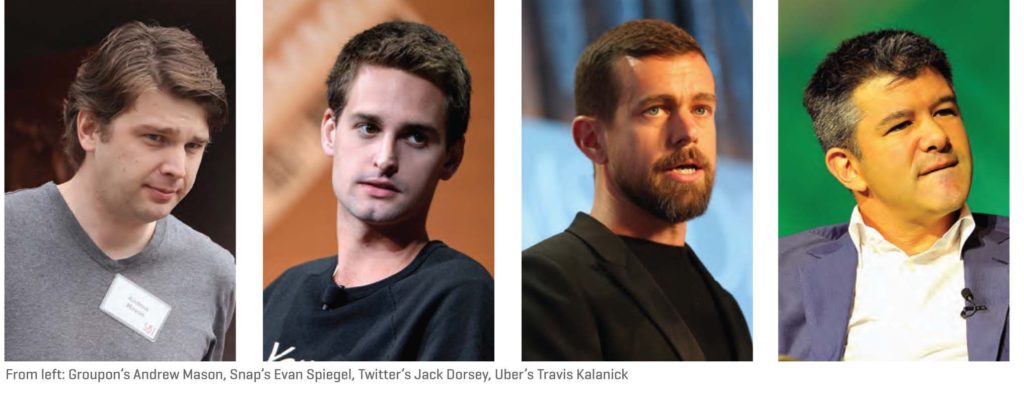 The New York Times recently featured a critical piece on the “bro culture” of tech startups titled “Jerks and the Start-ups They Ruin.” Trade media speculation abounds over the futures of founders like Snap’s Evan Spiegel, Twitter’s Jack Dorsey and Uber’s Travis Kalanick. Snap suffered huge, unexplained earnings misses, and Spiegel shows an unwillingness to apologize for past privacy breaches. Dorsey has struggled to run multiple firms simultaneously as CEO. Videos of Kalanick’s explosive outbursts have gone viral, and his tenure was marred and then derailed by multiple charges of sexual harassment in Uber’s culture, management turnover and legal charges over tax deceit, among other matters.
The New York Times recently featured a critical piece on the “bro culture” of tech startups titled “Jerks and the Start-ups They Ruin.” Trade media speculation abounds over the futures of founders like Snap’s Evan Spiegel, Twitter’s Jack Dorsey and Uber’s Travis Kalanick. Snap suffered huge, unexplained earnings misses, and Spiegel shows an unwillingness to apologize for past privacy breaches. Dorsey has struggled to run multiple firms simultaneously as CEO. Videos of Kalanick’s explosive outbursts have gone viral, and his tenure was marred and then derailed by multiple charges of sexual harassment in Uber’s culture, management turnover and legal charges over tax deceit, among other matters.
In 2012, CNBC labeled ousted Groupon founder Andrew Mason the worst CEO of the year, citing goofball antics more appropriate for an overgrown kid than a company leader—especially of a company with a market value of more than $3 billion. At both American Apparel and Lululemon, power-obsessed, autocratic founders intoxicated by their greatness have crossed the line with abusive, and even indecent, conduct.
Clearly the very fiery temperament of a flamboyant founder that drives bold entrepreneurial ambitions during a company’s inception can backfire later. Yet there are profound strategic and cultural risks to replacing founders, as edgy entrepreneurial vision is stifled by formulaic planning documents and the spark of spontaneity suffocated by rigid processes.
Sociologist Max Weber refers to this growth of bureaucracy as a needed “institutionalization of charisma.” The founder’s words and actions become canonized in dogma that ironically undermine the founder’s vision. After retaking the reins of the enterprise he founded, Michael Dell complained to me: “People were afraid to make changes to the business model I left them, but I [had] changed that business model six times. A business must stay fresh and change with the context. It is not a religion to be worshipped.”
“People were afraid to make changes to the business model I left them, but I [had] changed that business model six times. A business must stay fresh and change with the context.”
How have successful founders like Michael Dell, Bill Gates, Larry Ellison, Jeff Bezos and Mark Zuckerberg overcome this growth challenge? Here are four ways.
1. Leading New Life Phases. Founders must shift power from themselves as a hub via spokes to delegated authority figures. Examples of this include the Bill Gates/Steve Ballmer relationship at Microsoft and the Mark Zuckerberg/Sheryl Sandberg relationship at Facebook. Similarly, Larry Ellison yielded authority at Oracle to Mark Hurd and Safra Catz as CEOs.
2. Top-Level Mentoring. Early on with the company he founded in his college dorm room, Michael Dell wisely pulled into board service such wise advisors as Teledyne co-founder George Kozmetsky and former AMR CEO Don Carty, who served as vice chairman. Zuckerberg similarly tapped the wisdom of elder statesmen like Don Graham of the Washington Post Co., Netflix CEO Reed Hastings, Netscape co-founder Marc Andreesen and PayPal co-founder Peter Thiel, as board advisors.
3. Self-Critical Culture. At Netflix, a culture of “freedom and responsibility” gives employees the flexibility to pursue “sustained A-level performance” in areas such as revenue, viewings and earnings targets rather bogging them down with clunky controls, processes and policies. Similarly, Amazon’s Jeff Bezos allows his opinions, once voiced, to be overruled. As he noted in a 2017 letter to shareholders in reference to his response when his team proposed original show productions that he personally didn’t like, “I wrote back right away, ‘I disagree and commit and hope it becomes the most watched thing we’ve ever made.’… it’s a chance for the team to weigh my view, and a quick sincere commitment to go their way.”
4. Mission Alignment. Too often the venture capitalists on the board have a shorter exit time frame than the impassioned CEO who is building for greatness rather than building to flip. Ensuring alignment with the board and key stakeholders is critical.

Chief Executive Group exists to improve the performance of U.S. CEOs, senior executives and public-company directors, helping you grow your companies, build your communities and strengthen society. Learn more at chiefexecutivegroup.com.
0

1:00 - 5:00 pm
Over 70% of Executives Surveyed Agree: Many Strategic Planning Efforts Lack Systematic Approach Tips for Enhancing Your Strategic Planning Process
Executives expressed frustration with their current strategic planning process. Issues include:
Steve Rutan and Denise Harrison have put together an afternoon workshop that will provide the tools you need to address these concerns. They have worked with hundreds of executives to develop a systematic approach that will enable your team to make better decisions during strategic planning. Steve and Denise will walk you through exercises for prioritizing your lists and steps that will reset and reinvigorate your process. This will be a hands-on workshop that will enable you to think about your business as you use the tools that are being presented. If you are ready for a Strategic Planning tune-up, select this workshop in your registration form. The additional fee of $695 will be added to your total.

2:00 - 5:00 pm
Female leaders face the same issues all leaders do, but they often face additional challenges too. In this peer session, we will facilitate a discussion of best practices and how to overcome common barriers to help women leaders be more effective within and outside their organizations.
Limited space available.

10:30 - 5:00 pm
General’s Retreat at Hermitage Golf Course
Sponsored by UBS
General’s Retreat, built in 1986 with architect Gary Roger Baird, has been voted the “Best Golf Course in Nashville” and is a “must play” when visiting the Nashville, Tennessee area. With the beautiful setting along the Cumberland River, golfers of all capabilities will thoroughly enjoy the golf, scenery and hospitality.
The golf outing fee includes transportation to and from the hotel, greens/cart fees, use of practice facilities, and boxed lunch. The bus will leave the hotel at 10:30 am for a noon shotgun start and return to the hotel after the cocktail reception following the completion of the round.